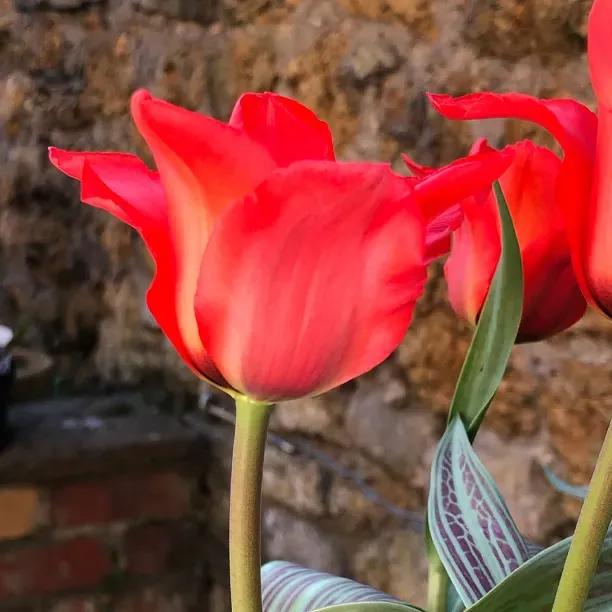'Red Riding Hood' Tulip Bulbs, Greigii
Honest Delivery Prices- Group: Greigii
- Colour: Red
- Height: 25cm
- Spread: 10cm
- Single headed stems
- Grey-green foliage streaked purple
- Ideal for rockeries & pots.
- RHS Award of Garden Merit
Recommended extras
Description
Red Riding Hood Dwarf Rockery Tulips
The short stems (up to 20-25cm high) support large, solitary blooms, a vivid scarlet-red in colour. Each petal is pointed, opening to reveal a black heart at the centre of the bloom. Variegated foliage adds interest both before and after flowering, the silvery-grey leaves generously striped and mottled with purple. Browse all of our tulip bulbs.
These are hardy blooms, appearing in early spring (April-May). Their short, sturdy stems make them perfect for exposed sites and ideal for container growing. Left alone, they will come back well year after year and may even multiply!
Red Riding Hood holds a Royal Horticultural Society Award of Garden Merit.
- Height: 25cm
- Spread: 10cm
- Single headed stems
- Grey-green foliage streaked purple
- Greigii Group
Plant Care
Tulips like to be planted in the colder weather of October/November. Plant the bulbs 15-20cm deep in well-drained, fertile soil, 10-15cm apart. (If planting in clumps, allow 7-9 bulbs per 30cm square; in pots, a dozen bulbs per 12-inch container will give an excellent display.) They will tolerate most soil pH, preferring neutral to slightly acidic. Good drainage is the key, especially so in containers; they like moisture but must not stand in water. Tulips would always choose full sun, but will tolerate partial shade.
Don't feed the plants during the growing season, as this will tend to produce leggy growth. If planting in containers, protect the pots from severe frost/wind by wrapping them up in straw or bubble wrap, or simply storing in the garage. Containers must be watered in dry periods leading up to flowering.
Dead-head the flowers once they have faded and remove the seed pod, but don't cut the foliage back until it has died down naturally as this will impede flowering in following years. This variety should continue flowering for several years unattended and may multiply if it likes the conditions. Transplant offsets by lifting the bulbs once the foliage has died right back. Clean and dry them, then store in boxes or net bags in a cool, dry place for planting the following autumn.
Look out for...
Keep a watchful eye out for slugs and snails as the plants emerge - take all your usual precautions until they are growing strongly.
Squirrels have a passion for digging up freshly planted tulip bulbs! If you know this will be a problem in your garden, plant them deeper than usual (30cm should foil their efforts), or cover the freshly dug hole with some chicken wire.
Did You Know...
Red Riding Hood was introduced in 1953. It is a member of the Greigii group of tulips, which all have variegated leaves.
Our Potted Bulbs A 1 litre pot contains approximately:- 10 small bulbs: anemones, crocus, dwarf daffodils, iris reticulata etc or
- 5 large bulbs: hyacinths, daffodils, tulips



 Img 5.webp)
 Img 2.webp)
 Img 3.webp)
 Img 4.webp)